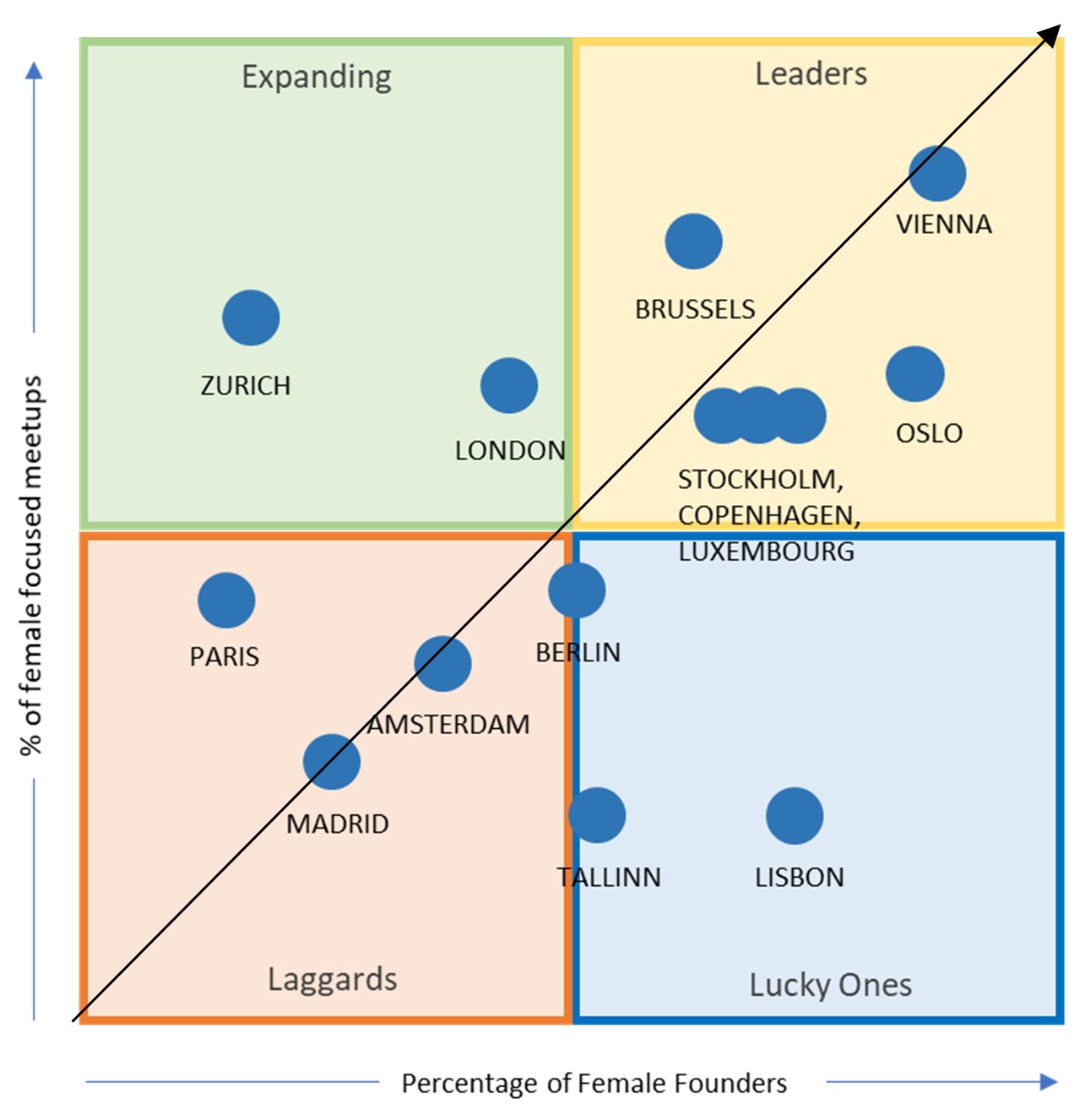DEEP Ecosystem Community publishes Strategy White Paper on Strengthening Startup Ecosystems for Female Entrepreneurs
The 2021 DEEP Ecosystems Conference brought together 175 practitioners and experts from the startup scenes of more than 45 countries to have data-driven discussions on the most pressing challenges their ecosystems face. In a series of Strategy White Papers, we publish the conference´s key findings and recommendations on building more transnational, inclusive, entrepreneur-driven, and impactful ecosystems. To get access to all publications, make sure to sign up to the newsletter.
Although a lot of progress has been made in female entrepreneurship in recent years which has also seen a development of the startup scene in general, a lot remains to be done. In today’s startup ecosystems, female entrepreneurship remains one of the biggest challenges. Our White Paper on Female Entrepreneurship provides some insight on the discrepancies between the performance of female and male founders and what can be done to support female entrepreneurship.
Strategy White Paper: Female Entrepreneurship
When it comes to female entrepreneurship, the numbers are grim. Only 15.5 percent of European entrepreneurs are female, as we found in our 2020 report on Women Entrepreneurs. This number reflects the state of women in tech in general, where 17 percent of ICT workers are female. In addition, only 7 percent of all venture capital funding goes to companies with at least one female founder. Our analysis of over 5,400 founders has found that female entrepreneurs raised less capital than men even though they built their businesses under the same conditions.
While the same number of female entrepreneurs as male raised funds after the accelerator programs ended, the amount raised was 38 percent less. Women entrepreneurs were thus deprived of €3 billion of funding.
Top 5 Facts
on Gender Equality in Europe’s Startup Scene
- Only 7% of VC funding in Europe goes to startups with a female founding team-member (Atomico 2018).
- The share of women working in the ICT sector in Europe is 17% (WID 2019).
- 15.5% of entrepreneurs in Europe are female (Startup Heatmap 2020).
- Only 554 out of 4,976 total VC rounds in Europe went to a team with a female co-founder.
- The discrimination of female founders amounted to 3bn € in 2020 based on the percentage of female founders and their actual funding received.
Covid-19 has worsened the picture for female entrepreneurs since many operate in the hard-hit retail sector, usually start out with less capital, which makes them more vulnerable to external shocks, and school closings disproportionally affected women, obliging them to assume additional childcare and homeschooling roles.
If we look at encouraging female entrepreneurship, just like studying how to fight female discrimination in tech, we find that these are part of a bigger problem and that diverse solutions are needed.
For example, only 7 percent of meetups in Europe are directed towards females. While this on its own should not be indicative of support, there seems to be a link between regions with more female-focused events and the number of female entrepreneurs.
From our research, cities in the Nordic region and Central Eastern Europe generally fare better, but some cities lag as can be seen from the graphic below.

But it’s not just about creating more events. Just like addressing how to fight female discrimination in tech and increasing the number of women in tech, it’s also important to allocate the right funding and provide other incentives to successfully fight against systemic inhibitors. Unfortunately, in many regions, institutional support for female startups is lacking. But some cities such as Vienna have led the way.
Vienna, through the Vienna Business Agency strives to create a welcoming environment where women feel safe and welcomed. It provides nurturing infrastructure and platforms and early-stage funding so that startups don’t rely on external funding and provides additional funding for female entrepreneurs. The agency also has initiatives geared towards female entrepreneurs and parents with services such as free kindergarten.
Our recommendations
Based on all this data and findings from the DEEP Ecosystems Conference, here are some recommendations to encourage female entrepreneurship:
- European Dialogue. The need for European Dialogue is pressing with broad discussions to bring the topic to light, provide more support at the local and grassroots level and formulate clear policy.
- Real Role Models. There needs to be a more realistic view of role models focusing on both lone wolf entrepreneurs who fight the odds, but also women who seek to solve real world problems through teamwork to achieve often less televised results.
- The Right Signaling. It’s not about giving women something extra; it’s about sending the right signals to tackle structural imbalances and show women that their skills and contributions are valuable and welcomed. This can be done by providing extra funding for women for example.
- Speak Easy Networking. It’s important to create a diverse network of events which allow women entrepreneurs to network and build strong connections, and to feel safe enough to share both their excitement but also doubts.
- Being considerate. It’s important to be considerate when it comes to female entrepreneurship initiatives. For example, evening events might make it more difficult for parent attendees, but breakfast events could be more convenient.
- Culture of Inclusion. Encouraging and nurturing female entrepreneurship is part of supporting diversity and inclusion in general. Entrepreneurship rests on the notion of individualism and making the weird the norm. It’s important to make female entrepreneurship part of that argument.
- Fighting Unconscious Bias. It’s important to educate decision makers at government agencies and venture capital firms about unconscious bias or better yet increase diversity in decision making bodies themselves.


